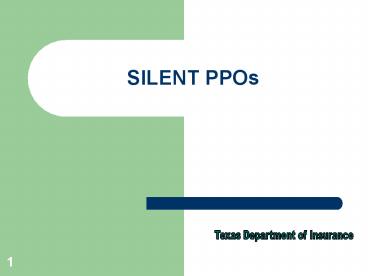SILENT PPOs
1 / 13
Title: SILENT PPOs
1
SILENT PPOs
Texas Department of Insurance
2
What is a PPO?
- PPO is an acronym commonly used to refer to a
preferred provider organization. - Many persons and institutions use the term
differently to refer to a health plan which
offers preferred provider benefits.
3
For purposes of discussion, a PPO is
- A group of health-care providers (such as
doctors, hospitals, and pharmacies) that agree to
provide medical services at a discounted cost to
covered persons in a given geographic area.
BLACKS LAW DICTIONARY 1217 (8th ed. 2004) - A group of health care providers each of whom
agrees to offer services to a given employer or
insurer at a lower cost in return for a stable
volume of patients or other incentives. ROBERT
W. STRAIN, INSURANCE WORDS AND THEIR MEANINGS 99
(1987).
4
What is a silent PPO?
- A silent PPO buys, sells, leases or otherwise
transfers provider discounts without regard for
steerage of patients to preferred providers. - These PPOs are also referred to as ghost,
non-directed, or blind PPOs.
5
How are silent PPOs addressed in the Texas
Insurance Code?
- Preferred Provider Benefit Plan (PPBP)
- TEX. INS. CODE 1301.056 addresses the sale,
lease or transfer of information regarding the
payment or reimbursement terms of a preferred
provider contract, including a contract with a
preferred provider organization. Chapter 1301
applies to preferred provider benefit plans.
(See 1301.001(9).)
6
How are silent PPOs addressed in the Texas
Insurance Code?
- TEX. INS. CODE 1301.004 sets forth the general
applicability of TEX INS. CODE Chapter 1301
each preferred provider benefit plan offered
in this state must comply with this chapter. - Further, TEX. INS. CODE 1301.002 clarifies that
Chapter 1301 does not apply to a provision for
dental care benefits in a health insurance
policy.
7
How are silent PPOs addressed in the Texas
Insurance Code?
- Preferred Provider Benefit Plans (PPBPs)
- Over which parties does TDI have authority?
- Insurers (TEX. INS. CODE 1301.001(5))
- Third party administrators (TPAs) TEX. INS.
CODE 4151.001(1))
8
How are silent PPOs addressed in the Texas
Insurance Code?
- Workers Comp Health Care Networks (WC Networks)
- TEX. INS. CODE 1305.1545 sets forth specific
restrictions on an insurance carriers or third
party administrators ability to reimburse
providers on a discounted basis for services that
are provided to an injured employee. Chapter
1305 applies to workers compensation health care
networks.
9
How are silent PPOs addressed in the Texas
Insurance Code?
- WC Networks vs. PPBP
- TEX. INS. CODE 1305.1545 has a much broader
application than does TEX. INS. CODE 1301.056.
Chapter 1305 provides standards for the
certification, administration, evaluation and
enforcement of the delivery of health care
services to injured employees by networks
contracting with or established by carriers.
10
How are silent PPOs addressed in the Texas
Insurance Code?
- WC Networks
- Over which parties does TDI have authority?
- Insurance Carriers (TEX. LAB. CODE
401.011(27)) - TPAs (TEX. INS. CODE 4151.001(1))
11
How are silent PPOs addressed in the Texas
Insurance Code?
- WC Networks
- Chapter 1305 sets rigorous requirements to ensure
that a network has the ability to provide
continuity, accessibility, and quality of
services and imposes a quality of care
requirement that each network implement a
documented process for the selection and
retention of contracted providers in accordance
with rules adopted by the commissioner. TEX. INS.
CODE 1305.301(d)(1), 1305.302(b) and (g), and
1305.303(h).
12
How are silent PPOs addressed in the Texas
Insurance Code?
- WC Networks
- TDI rule 10.42(b)(14) requires provider
contracts and subcontracts to include a statement
that the provider specifically agrees to provide
treatment for injured employees who obtain
workers compensation health care services
through the network that is specifically
identified in the contract as a contracting
party. (28 TEX. ADMIN. CODE)
13
How are silent PPOs addressed in the Texas
Insurance Code?
- WC Networks
- Since TDI certifies the WC networks, and as part
of certification, reviews contracts, the networks
are subject to a higher level of scrutiny.


















![READ [PDF] The Strong, Silent Type: Over 100 Screen Cowboys, PowerPoint PPT Presentation](https://s3.amazonaws.com/images.powershow.com/10093382.th0.jpg?_=202408070411)












